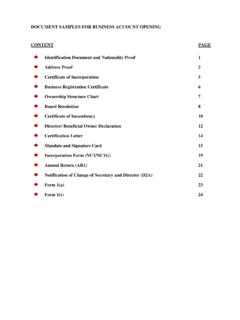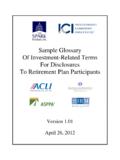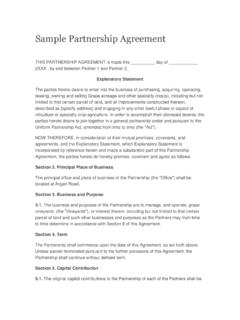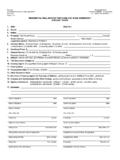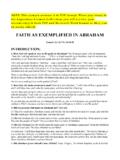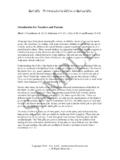Transcription of Development Needs Inventory - Teleometrics
1 DNI Feedback Report For John Doe Acme Company Date: January 1, 2003 Development Needs Inventory A 360 Analysis of Management Strengths and Development Needs Page 1 of 15 New EvaluationDisclaimer: Teleometrics International, Leadership Management. Inc., Leadership Systems Corp. and accociated distributors assume no responsibility for the usefulness of this DNI report to the extent that it depends upon the selection of informed Observers, upon the accuracy of their perceptions, and upon how clients interpretand apply the results.
2 The information contained herein, when properly interpreted and applied is usefulas a management Development tool, and it is designed for no other purpose. Note in particular that the DNI is not a performance evaluation instrument. J. Clifton Williams, , AuthorTeleometrics InternationalCopyright by Leadershp Systems Corporation. All rights reserved1. Take it seriously! lThis report provides you with a rare opportunity to see yourself as others see you in the workplace. 2. Carefully examine the report.
3 LCarefully study each of the different ways in which your feedback is presented. These different modes of presentation are designed to help you gain insight and ultimately to develop an action plan for behavior change. 3. Avoid being defensive. lDo not become defensive when others do not see you in exactly the same way you see yourself. lKeep in mind that perceptions are important! Others react to you in terms of their perceptions of you, not your perception of yourself. 4. Remember, perception is not performance.
4 LDo not confuse feedback on the DNI analysis of your Development Needs with performance evaluations. lTo understand the difference, visualize the most effective manager you have ever known one who always gets the best possible performance evaluations, and for good reasons. Was he or she perfect? Certainly not. Even the best managers are much stronger in some areas than others, and their performance is outstanding because their strengths (for example in decision making) compensate for less-than-ideal contributions of other areas (say, motivating skills and interpersonal relations).
5 LThe DNI 360 feedback provides insight into relative strengths and thereby provides a realistic basis for continuing growth and Development . 5. Look at the whole picture. lDon't focus on your Development Needs alone. Consider your strengths as well. Identifying strengths can significantly contribute to your personal growth, self-confidence, and self-esteem. 6. Information for action. lThe information and insight concerning your strengths and Development Needs is not the end result of your 360 feedback.
6 If you do not convert these into action ( , positive behavior change) you have not benefited from them, at least not in any practical way. Resources are available to help you transform information and insight into action. How to Benefit From Your DNI Report John Doe Page 2 of 15 New EvaluationCommunication Managers with high scores on this scale are good listeners and are skilled in transmitting to others the intent of their own words, actions, and manner of expression. Delegation Managers who are skilled in delegation achieve high productivity by selecting the most capable delegatees, clearly communicating the objectives to be achieved, providing maximum empowerment, and holding delegatees accountable for results.
7 Empowerment Managers who are skilled in the process of empowerment use their own organizational power and personal leadership skills to provide others with the resources they need to be effective. They empower their Direct Reports, of course, but they also empower their leaders and peers rather than undermine their power and influence. Scale Definitions and Scores for John Doe Page 3 of 15 New Evaluation10/28/2003 trust Building Managers who are trust builders possess several interacting qualities such as personal integrity, technical competence, leadership skills, and excellent judgment that cause others to view them as trustworthy and make such managers centers of trust building within any organization or group of which they are a part.
8 Decision Making Effective managerial decisions reflects a sense of purpose, good judgment, personal integrity, and a balanced concern for organizational goals and the worth of the individual through whom those goals are achieved. Because they involve risks, good decisions do not always produce positive outcomes but they always result from the use of good decision process. Interpersonal Relations Managers with superior interpersonal relations establish long-term relationships of trust , cooperation, mutual respect, and mutual support.
9 When appropriate, they skillfully challenge, disagree, and confront others, but they do so without destroying these valued relationships. Page 4 of 15 New Evaluation10/28/2003 Motivating Skills Managers with superior motivating skills are effective in providing the rewards, inspiration, and trust that others need for peak performance. These skills are expressed in all relationships, not solely in relationships with direct reports. Adaptability Leaders who are adaptable serve as change agents within their organizations; they adapt and grow as needed to deal realistically with current and anticipated environmental change in, for example, markets, the economy, society in general, and the Needs and demands of their organization.
10 Leadership By definition, effective leaders are highly influential. They take advantage of every opportunity to motivate with rewards, persuasion, trust building, and inspiration rather than with intimidation and coercion. By these and other means, effective leaders transform subordinates into productive followers who share their organization's values and goals. Page 5 of 15 New Evaluation10/28/2003 Team Building characterizes leaders who are themselves team players and who inspire followers to develop a broad repertoire of job-related skills, to flexibly change roles as called for by each new situation, to be highly cooperative, and to collectively focus on achieving their assigned objectives.

